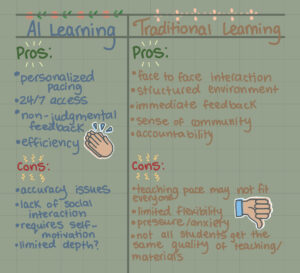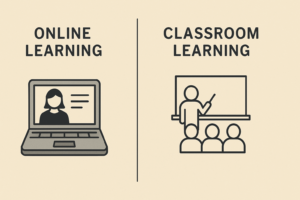Hi Therese nice to meet you!! Your blog post is really insightful, well-structured and easy to understand! I liked the way you linked creating learning communities and digital communities with study circles and Reddit forums caught my attention for sure. I found it really relatable when you were talking about self directed learning and about using YouTube to learn about the phases of Alzheimer’s. Maybe something you could elaborate on is how one might handle digital distractions on such public platforms? Another thing i thought of is maybe to include a brief example of how each learning style may use social media in order to summarize the different learning style kinds. Your conclusion really brought everything together super well, and your illustrations and citations were great! You kept me really interested the whole time i was reading, great post:)
Page 2 of 3
Hi Ella, I had a great time reading your blog post! You talking about finding your calling in fourth grade was very motivating and your explanations of how social media supports individualized and micro learning particularly caught my attention. I wonder if you could elaborate a little more on the negative aspects of social media in the classroom? Additionally, i really appreciated how well structured your blog post was, it was really easy to read! I also love the pink background I like how you related digital literacy and online presence to your own experiences. Overall, really good work! Im excited to read more of your works:)
I am in Pod group Number 8 with Tori and Sanya, I met Sanya today and discussed briefly on what social media’s we are going to compare and when we are going to connect. We have set a day to connect, and will be communicating through mattermost, and I have also communicated with Tori!
Learning in the Digital World
Hello everyone! My name is Lyndsay Fisher, I am a fourth year in Psychology. I recently did EDCI 339 which focused on open learning, it was a really fun and interesting course and I see that some aspects tie into this course. I really enjoyed having a blog and engaging with other classmates so I’m excited to for this course!

Social Media:
I initially mainly used social media for socializing with my friends, posting pictures, and to see what’s happening around the world. Overtime, websites like TikTok and YouTube have played a huge role with my learning, especially since I’m a visual learner and it’s quick. In Indeed, out of the 10 categories that have helped me learn are social networking, discussion forums and video hosting platforms. These resources have helped me participate freely and engage me to learn. Ive provided an article below which dives into how engaging social media can be for learning.
https://pmc.ncbi.nlm.nih.gov/articles/PMC8979785/
Personalized Learning & Digital Literacies:
With personalized learning, it’s more flexible, stress-free and independent for the learner. I stay more motivated and stress less when I can select my own time, tools, and resources that best suit my learning style. This is also why I love this course since its very much at your own pace. Digital literacy is also very important, and it’s more than just being good with the computer. in the Cambridge ELT blog, it dives into critical thinking, information evaluation and online safety. With this, I have been more self-reliant and assured.
- use tools and learn in ways that works for you
- be in control of your own learning
- think critically about what resources you read
- stay safe!
https://www.tiktok.com/@thetruthfultutor/video/7324788663148367150
Digital Identity:
Over the years i started establishing an online presence, I started to understand that my posts, likes and shares influence how other people online perceive me. The online environment can be intimidating, so if you’re creating an identity for yourself I think it’s important to stay truthful, considerate and respectful for yourself and others.
Ethical Online Space:
I’m still trying to work on using internet resources appropriately, especially when it comes to citing and resources I find (if they are truly viable). FutureLean notes that ethical involvement involves creating an inclusive and secure environment for everybody. This would involve giving credit, being kind, and trying to avoid sharing false information. I think when we have our conversations in person, it should also be reflected in a way how we behave online.
| Do’s! | Dont’s |
|---|---|
| Protect your privacy and others | Share personal/sensitive information without reflection |
| Fact check information before sharing | Spread misinformation |
| Encourage diverse perspectives and thoughtful discussion | Shut down others opinions / dominate the conversation |
| Report harmful/inappropriate behaviour | Ignore hate speech/bullying |
Final thoughts:
Overall, the digital world offers so much growth, connection and expression in ways that I still can’t comprehend. I’ve learned so much over the years especially as a student through social media, engagement online and personalized learning. Im excited to see what the future entails when it comes to learning online!
Yesterday we started off with introductions and talked about Social media. Mainly about how we perceive social media, we dove into the good, bad and ugly. A topic that stood out to me was the question “When you think of social media, what comes to mind?”, I had some great conversations with my classmates in the breakout rooms, we all had different and similar views on how we think of social media; it was nice to hear everyone’s opinions. When I think of social media I think of it being a valuable place for learning and connection, but also bad and ugly. I’m feeling really good about this course so far, I like how it’s very interactive and the topics we have, and will be discussing sparks my interest!
Starting point:
This project sparked my interest, as it ties in psychology, education and technology. We questioned whether AI open learning is more adaptive to individual needs vs. Traditional learning roles (in-person classrooms). As AI continues to be introduced in classrooms, we wanted to see how well and reliable it can be for students. According to studies, AI systems can bridge learning gaps by customizing info that fits a learners pace, skills, and/or preferences. We made a commitment to write weekly blogs that revolved around experimenting with AI tools, reading some articles and doing some reflections.
Quizlets AI summary:
I decided to look into Quizlet and new addition of AI. I’ve been using this learning app to make flashcards but never used the AI component until this course. I uploaded some of my notes from my previous PSYC class and used the “Practice Test” tool to see how helpful it really is.
There was a notice that read “This product is enhanced by AI and may provide incorrect or problematic content”. I noticed that some of the questions it generated wasn’t totally aligned with my notes or fully correct. Emilia David (2023) wrote about a similar experience using Quizlet’s AI. This supported my suspicions and served as a reminder that even though AI is very helpful, it cannot always take the place of human reasoning, accuracy and learning/original content.
AI learning vs. Traditional roles:
Throughout this topic, there was a lot that I thought about when it comes to AI-based learning and traditional roles in learning. Traditional learning has been integrated into our lives for thousands of years, whereas AI learning is very fresh. Learning in a physical classroom can offer structure and human connection, however it doesn’t really permit flexibility or individualized pace. Whereas AI learning allows you to learn at your own speed. You can skip forward, go over a subject more than once, and it’s quick! Students who may need additional time in their works might find AI learning to be a benefit. Avinash Chander (2025) recognizes the benefits and limitations of traditional learning and AI learning, and dives deeply into human interaction and emotional support. That being, traditional classrooms foster student relationships and trust, and AI is accessible and excessible at anytime.

EDCI pros and cons AI traditional
These distinctions made it clear to me that AI isn’t better or worse than traditional learning its just a little different! AI offers flexibility but isn’t always reliable, whereas traditional learning provides structure and clarify but might come across inflexible for some
Final thoughts:
Overall, I still acknowledge that the structure of traditional learning benefits me. I find being in a physical classroom provides me with routine and holds me accountable, including that I’m more motivated to connect with the content because of the real-time engagement. Although, i do like the freedom of AI learning, I’ve found that having to much autonomy might make it more simple to put things off or overlook information. I find the most successful strategy is balance AI as a sort of addition, while still relying on traditional learning.
Refrences:
https://www.linkedin.com/pulse/ai-powered-vs-traditional-education-whats-future-learning-chander-0d3ic#:~:text=Rather%20than%20choosing%20between%20AI,provide%20emotional%20support%20and%20clarification.
https://www.pearson.com/content/dam/one-dot-com/one-dot-com/global/Files/about-pearson/innovation/open-ideas/Intelligence-Unleashed-Publication.pdf
https://www.forbes.com/sites/rayravaglia/2023/08/10/quizlet-embraces-ai-and-chatgpt-to-transform-the-experience-of-studying/
One of the AI tools i looked into was Quizlet, this was a study guide I used a lot for years, and I found out last semester that it now has AI so I decided to investigate it a little bit. I started by uploading some of my old psychology notes (from PSYC 339) since i wanted to see how much it had changed. With that, Quizlet had created a AI practice test. I noticed there was a caution at the bottom my screen which said “This product is enhanced by AI and may provide incorrect or problematic content.”. The caution basically proved to make its point, while the AI generated questions were useful, I found that some of the info it extracted from my notes wasn’t totally correct. I became a little more careful and skeptical when it comes to studying with QUizlet AI. An article i found created by Emilia David, mentioned how she experienced some problems with Quizlet AI, and how the questions were nonsensical and improperly phrased (The Verge, 2023).
Although AI has definitely helped with Quizlet’s functionality and performance, and for most the time it helps with assisting students with study materials, there is some documented problems. When I create my own flashcards or study with a group, there isn’t any obvious technological problems since it is in person, which brings me back to thinking the AI learning experience can be unreliable at times. I acknowledge how AI can save a lot of time and you can create it how you want it, however it still lacks the context and critical thinking that humans offer.
As of right now, I feel the AI is a useful addition in Quizlet, however I wouldn’t completely rely on it for in-depth understanding where precision is crucial.
Refrences:
https://www.theverge.com/2023/8/9/23826191/quizlet-generative-ai-chatgpt-education
https://www.forbes.com/sites/rayravaglia/2023/08/10/quizlet-embraces-ai-and-chatgpt-to-transform-the-experience-of-studying/
For this project, Nia and I were interested in the expanding use of artificial intelligence (AI) when it comes to education, especially for students negotiating the reality of open and distributed learning. We decided to investigate the following topic, on AI-based learning tools and if they adapt better to individuals needs rather than traditional roles. With AI technologies like ChatGPT, Duolingo, and Khan Academy becoming increasingly popular in both official and informal learning settings, we wanted to investigate how well these platforms actually support student success, particularly in asynchronous self-paced learning. We also, want to consider how they affect our academic development and motivation.
This topic was appealing to us because it connects a few different fields together, such as education, psychology and technology. Researchers are aware that modifying information delivery to each students pace and learning preferences, AI learning holds a promise for closing learning gaps (Luckin et al., 2016) However, with that potential raises some questions, like are these resources available or fair? Do they promote or obstruct meaningful interaction? Or maybe what occurs when technology motivates us? Overall, there are lots of things to keep in mind when it comes to AI in the learning environment, and we will dive more into that with questions, research, and reflections.

The structure of our Free Inquiry Project is solely based around weekly blogs that demonstrate our learning process. A different area of AI in education will be covered each week, which includes tool testing, research, our reflections, and considerations that are ethical. For our learning approach, we will combine our work with open educational resources and AI techniques. Our blog posts will consist of our reflections, links, videos or photos, which will be used to document or progress or
Refrences:
https://static.googleusercontent.com/media/edu.google.com/en//pdfs/Intelligence-Unleashed-Publication.pdf
The more i read about this week for ECDI 339, I have gained more insight on open learning. I read a decent amount about open learning’s potential, which emphasized a lot on access, cheaper education and overall creativity, the Common Wealth and Learning introduction and Open Education Resources (OEP) mentioned this. But it makes me think about the digital divide that exists today, if it’s really good why isn’t it widespread throughout society?
When i read “Open Pedagogy: A Response to David Wiley” there was the “5 R’s” (Retain, Reuse, Revise, Remix, Redistribute content) which went into a lot of detail and made lots of sense to me. I didn’t originally think about the hidden costs of resources that are free, such as a concern for privacy, but Wiley dove into that concern. I started to wonder if open learning is really open if injustices aren’t addressed after Cronin fought for social justice in open pedagogy. Sharing resources is only one aspect of it, another is inclusion, which i think is something really motivating that has true potential to improve education everywhere.
Wiley’s article on OEP, demonstrated how encouraging teamwork can transform education and set new opportunities of creative learning. Open learning sounds fantastic, and has the ability to reach everyone. With further work, open learning seems to be heading in the right direction! I’m eager to see how far we can push it.
I read some of “Openness and Praxis” and I found a concept that caught my eye which was “context collapse” that Marwick and Boyd mention in references. All aspects of our lives kind of collide together in one area, online. I was surprised by how much this spoke to me. If I’m being honest, I’ve never really been too comfortable learning or simply interacting online through technology. Conversations tend to feel more organic in a classroom for me, however I learnt some more about openness in this article. We may feel obligated to share everything online, but you can choose what you’re comfortable with!
I also watched Jon Dron’s video “How Distance Changes Everything”, he mentioned there is 3 aspects to intrinsic motivation in the classroom, which is autonomy, competence and relatedness (15:06). I think these 3 key points he mentioned really made sense to me. He emphasized on community and that struck a chord with me the most, it served that learning depends on connection, even if it’s online.
Overall, there are so many different way to build a connection with our community online, especially in this class since we have this blog. I’m aiming to be more open about how I participate in open learning environments now and in the future, but also keeping in mind of some methods that protect my privacy too! I’m very excited to learn more from others and through this course!